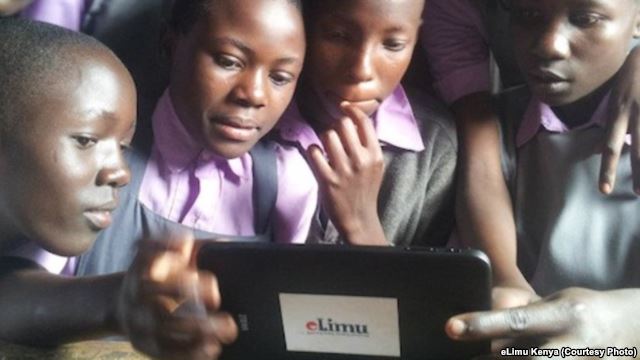VOA慢速英语: 教育专家建议老师支持电子数码科技产品
 |
| Children in Kenya using eLimu tablet to access educational software. |
Education experts have urged teachers in Kenya andelsewhere in Africa to embrace digital technologies toimprove teaching and learning. The call was made byspeakers during a two-day international conference. The meeting, called "Education Innovation Africa," washeld on June 8 and 9, 2015 in Nairobi.
Conference organizers said their goal was toshowcase inspirational ideas for improving teachingand learning using technology.
Isaac Kinyanjui of eLimu Kenya, an educationtechnology start-up company, spoke to the delegatesabout what he called 'smart' classrooms of the future inAfrica. He said such classrooms will require teachersand learners to be innovative beyond the use oftraditional textbooks.
"Publishers won't allow the reproduction of entiretextbooks because they still need to sell their books. Sowe need to be innovative about digital contentdevelopment," Mr. Kinyanjui said.
He added that the content has to be "rich and culturallyrelevant." He said students should be able to use it onmultiple platforms, such as PCs, laptops, computertablets and mobile phones.
eLimu Kenya develops apps and content for digitalplatforms. Mr. Kinyanjui said the company was already employing securitytools to ensure that pupils can only access safe content from the Internet. Hesaid solutions have been found for other challenges, such as unreliableelectricity and Internet connectivity, by improvising with solar power and storedor downloaded content.
Another speaker, Albert Korir of Drury University, USA, demonstrated thepower of digital teaching and learning. Professor Korir said that, at higherlevels of academia, science students may use digital simulators. Thesimulators allow them to learn how to operate machines or equipment thatmay be expensive. This was already being done in the United States andcould also be done in Africa, he said.
Prof. Korir said online resources for sciences, such as ASDL (AnalyticalSciences Digital Library) and Khan Academy, are widely used by learninginstitutions in developing countries. These same resources can be useful inAfrican academic institutions, he said.
Emma Dicks, the founder and co-director of Code4CT, South Africa, said herorganization focuses on teaching young girls basic coding skills. She said thegirls can use these skills to design solutions for real-life problems in the localcommunity and even for commercial clients.
Ms. Dicks said her organization works with schools in Cape Town, SouthAfrica. Code4CT teach girls how to code for social impact. The aim is tochange the perception of women in IT. Ms. Dicks said the organization wantsto reach out to women who would otherwise avoid studying IT-relatedsubjects.
She added that the students learn how to present projects to clients. Thispractice develops language for professional communication at an early age. She said clients are brought in from local industries. Guest speakers are alsoinvited from nearby IT and engineering industries, thus giving students real lifescenarios of the work environment, she said.
Another speaker was Antony Gioko of the Aga Khan Academy in Mombasa. He challenged teachers to create their own personal digital footprints.
"Your students have them already (digital footprints,) so you too need to getonboard," said Mr. Gioko. He added that the basic digital footprints for ateacher are a Skype account, Twitter, WhatsApp and a blog.
"If you are teaching pupils about the Maori of New Zealand, it is better if you doa Skype session with a real Maori in New Zealand than trying to explain from atextbook," said Mr. Gioko.
He added that it was imperative for teachers to shed the old ways of teachingand adapt the modern 21st century methods of engaging with learners. Hesaid the excuse that teachers give about "following the syllabus" is not validbecause the syllabus is just an outline that allows for autonomy and creativityin the actual learning process.
Mr. Gioko said the learning environment is not merely the classroom and theschool compound, but also includes the parents of pupils and the localcommunity.
He emphasized the need to balance learning for exams and learning for activecitizenship, whereby pupils invest not only in academic theory but also thepractical aspects of what they learn.
The inaugural Education Innovation Africa conference provided a platform tounite local and international educators with investors, financiers andentrepreneurs. Kenya was chosen as the first site for the forum for its drive fordigital innovation.
Exhibitors displayed innovations in educational technologies, includinginteractive whiteboards and screens that can be used in classrooms.
Less than one third of primary school pupils possess basic literacy and mathskills for their level. That information comes from a 2012 report by Uwezo, aproject set up for the purpose of studying the state of education in east Africa.
______________________________________________________________
Words in This Story
simulator- n. a machine that is used to show what something looks or feelslike and is usually used to study something or to train people
IT- n. short abbreviation for information technology, the study or use ofsystems (especially computers and telecommunications) for storing,retrieving, and sending information.
scenario- n. a description of what could possibly happen
digital footprint - n. the data that is left behind by users on digital services.
- 频道推荐
- |
- 全站推荐
- 推荐下载
- 网站推荐




















